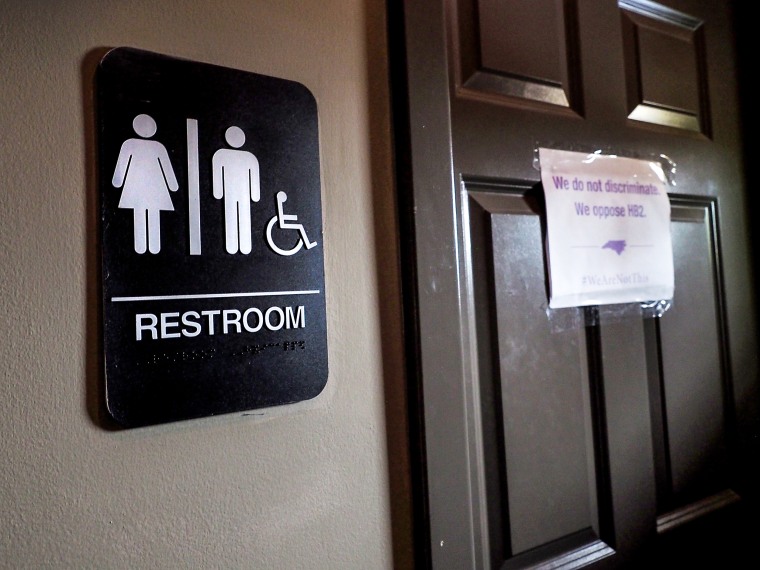A federal judge struck down a Tennessee law Tuesday that would have required businesses in the state to post warning notices on their public restrooms if they have policies allowing transgender patrons to use the facilities that match their gender identities.
The American Civil Liberties Union challenged the law in June on behalf of two business owners — the owner of Sanctuary, a performing arts and community center in Chattanooga, and the owner of Fido, a restaurant in Nashville, among other businesses.
The law went into effect on July 1, but U.S. District Judge Aleta A. Trauger issued a preliminary injunction against it a week later. Then on Tuesday, Trauger permanently blocked the law by granting the ACLU's motion for summary judgment, which asks a court to decide a case without a full trial.
She wrote in a 40-page decision that the law violates the First Amendment of the Constitution because it compels speech that is controversial and with which the plaintiffs disagree.
"It would do a disservice to the First Amendment to judge the Act for anything other than what it is: a brazen attempt to single out trans-inclusive establishments and force them to parrot a message that they reasonably believe would sow fear and misunderstanding about the very transgender Tennesseans whom those establishments are trying to provide with some semblance of a safe and welcoming environment," Trauger wrote.
Glenn Funk and Neal Pinkston, both district attorneys; Christopher Bainbridge, the state director of code enforcement; and Carter Lawrence, the state fire marshal, are named as defendants. They did not immediately respond to requests for comment. A representative for Gov. Bill Lee has also did not immediately respond to a request for comment.
The law required business owners with even informal policies that allow people to use whichever bathroom they want to post a sign that reads, “This facility maintains a policy of allowing the use of restrooms by either biological sex regardless of the designation on the restroom,” at the entrances of single-sex public restrooms, locker rooms, dressing areas or other facilities that are “designated for a specific biological sex ... where a person would have a reasonable expectation of privacy.”
The law said the sign must be at least 8 inches wide and 6 inches tall and use the colors red and yellow, with a boldface typeface, among other requirements.
Representatives for the state argued that the law is a "content-neutral" rule meant to clarify restroom signage and is not meant to be an endorsement of how gender identity should be understood, according to the opinion. The ACLU's clients, they argued, have “imagined an idiosyncratic, hidden undertone to the [required] signage.”
Trauger, who was appointed to the court by President Bill Clinton, disagreed, noting that the government's preferred view of how gender works — that it is dictated by "biological sex," which is assigned at birth and is limited to male or female — is contested.
"The only thing that is imaginary in this case, though, is the imagined consensus on issues of sex and gender on which the defendants seek to rely," Trauger wrote. "Transgender Tennesseans are real. The businesses and establishments that wish to welcome them are real. And the viewpoints that those individuals and businesses hold are real, even if they differ from the views of some legislators or government officials."
The ACLU and its clients celebrated the decision.
“We applaud the court for recognizing that this law violates the First Amendment and harms transgender people,” Hedy Weinberg, the executive director of the ACLU of Tennessee, said in a statement. “Transgender individuals should be able to live their lives free of harassment and discrimination. Today’s decision ensures that the businesses who welcome them are not forced to become instruments for politicians’ discrimination.”
Bob Bernstein, the owner of the Nashville restaurant Fido, has an informal policy that allows customers to use the restroom they feel is most appropriate. He said he has not had any complaints or concerns about the policy, and he objected to the "stigmatizing" message the law required.
“As a former journalist, I believe strongly in free speech,” Bernstein said in a statement. “The government can’t just force people to post discriminatory, inaccurate, and divisive signs in their places of business. I am glad that the court recognized that this law violates the First Amendment.”

Advocates have described the law as a new iteration of "bathroom bills" passed in 2016, such as House Bill 2 in North Carolina, which sought to bar trans people from using the bathrooms that aligned with their gender identities.
The sponsor of Tennessee's law, Rep. Tim Rudd, R-Murfreesboro, said in legislative debate in May 2021 that the bill is meant to protect women and children “against sexual predators that could be taking advantage of policies, executive orders or legislation that may allow the opposite sex to enter a restroom, shower or locker room,” the Chattanooga Times Free Press reported.
Trauger wrote in her opinion that Rudd "was unable to provide examples or evidence of such a problem," although he argued that “we shouldn’t wait for people’s rights to be abused” to potentially prevent “an attack.”
The issue is not new, advocates have said, and proponents of bathroom bills passed in 2016 cited similar arguments. A 2018 study from the Williams Institute at UCLA School of Law found there is no evidence that trans-inclusive policies for public facilities increase safety risks.
